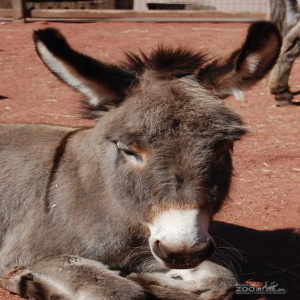Miniature Donkey
[Equus africanus asinus (miniature)]

The size of miniature donkeys varies from 26 inches, which is considered extraordinarily small, to 36 inches at the withers. An average height would be about 33-34 inches. Gray-dun, the various shades of gray with the dorsal stripe and cross is the most common color of these donkeys. The average donkey will weigh from 250 to 450 pounds with most animals being in the lower weight ranges. The hair ranges from flat to curly to long and shaggy and in texture from smooth to wiry. The hair coat is shed out much later in the summer than that of the horse and serves to protect the donkey from the weather and the flies. Almost all of these donkeys will have a "cross." The cross is a dorsal stripe of darker hair down the length of the back crossed by a shoulder stripe across the top of the body at the withers and showing down the shoulders. Most of the donkeys will have darker markings on the ears, the tip of the tail and around the feet. Some have "Garters" or stripes ringing the legs as well. A few of the donkeys have "collar button" markings, which are dots of black hair on the neck just below the place where the head joins the neck.
Location: Kookaburra Station
Share:
Range
Miniature donkeys are native to the Mediterranean islands of Sicily and Sardinia. They were first imported into this country in 1929.
Habitat
Miniature donkeys inhabit broken, undulating, stony desert country.
Conservation Status
Primary Threats
Gestation
Gestation in the miniature donkey ranges between 12 to 13 months.
Litter
Normally 1
Behavior
The Miniature Donkey is by nature one of the friendliest and most affectionate animals of its type. They are very tame and gentle. They are also easier to manage in everyday life than some donkeys simply because they are smaller. They love their owners and seek attention. They do this with friendly nudges and brays and funny little sounds designed to get you to pay attention to them. The miniature donkey is extremely intelligent and docile and is easily trained. Geldings or jennets make the best pets. Jacks enjoy braying and may become excited in the presence of the females. The old wives tale of donkeys being stubborn, is actually a sign of their intelligence. They are very cautious animals and will not proceed if they are unsure of a situation. Miniature Donkeys have an average life span of 25 - 35 years. They communicate with their human owners and other donkeys by ‘braying’, also more commonly known as a ‘hee-haw’. Every donkey has his or her own style of braying with some sounding quite comical.
Reproduction
Reproductive anatomy of the miniature donkey is similar to that for the standard horse. Female miniature donkeys have a 21 to 28 day estrus cycle with obvious behavioral signs when a jack is present.
Wild Diet
Grasses and sedges, forbs, browse
